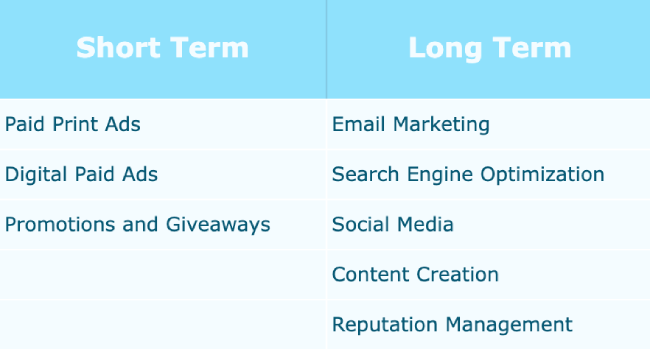
When it comes to marketing, you want to be successful, but what does success look like for your business? The easiest way to define success is through specific, measurable goals. When it comes to these goals, you have two types from which to choose: Long-term and short-term. What are these goals, and how do you ensure that they are realistic and achievable? Read on to learn more!
The Difference Between Short-Term vs. Long-Term Marketing Goals
As their names imply, the difference between the types of marketing goals is primarily the time that elapses between setting the goal and realizing it. In general, short-term marketing goals are goals you hope to reach within the next 6 months, and are often ones you hope to achieve within even less time. Long-term marketing goals are the ones you hope to reach within the next 6 to 18 months (And sometimes even longer).
Short-Term vs. Long-Term Marketing: Some Examples
When it comes to achieving these goals, some strategies naturally generate short-term results, while others naturally generate longer-term responses from consumers. The marketing strategies you adopt, therefore, will depend in part upon your specific marketing goals.

Here is a look at some strategies you may want to consider for each of your marketing goals.
Short-Term Marketing Strategies
⏩ Paid Print Ads
If you want to generate leads and conversions in a short window of time, you may want to invest in paid print ads, also known as direct mail. From appearing in magazines to showing up in newspapers, these ads tend to generate a rapid response by using a clear and direct call to action (CTA) and targeting consumers who are ready to act.
⏩ Digital Paid Ads
These ads can take many forms, including display ads, Google Ads that show up in the search results, and social media ads that pop up in consumers’ news feeds.
These ads tend to get quick results because they include a call to action (CTA) that encourages an immediate response and because they become active as soon as you start your ad campaign.
In addition, you can usually target these ads directly to your preferred audiences. For example, social media ads and Google Ads both allow you to define who sees your ads based on demographic information such as the following:
- Gender
- Age
- Hobbies
- Jobs
- Geographic location
- Search terms
- Previously purchased items
- Previous presence on your website (A strategy called retargeting)
⏩ Promotions and Giveaways
Sometimes, you may want to jumpstart progress toward your short-term marketing goals with promotions and giveaways. These events and offers encourage a rapid response because they provide a desired product or service for a short period of time. Individuals who may want that product or service will need to act quickly to get it at the special rate or discount.
Long-Term Marketing Strategies
▶️ Email Marketing
Email marketing, whereby you send email communications to specific lists of leads and contacts, has one of the highest ROIs of all digital marketing strategies. However, this is a long-term strategy that will take time to bear fruit. Often, the most effective approach is to create a campaign of several emails sent over the course of weeks or months to target audiences. For example, you may send a series 3-4 emails to encourage a response from cold leads, to generate interest in your business, or to guide consumers through the sales funnel toward a conversion.
▶️ Search Engine Optimization
Also referred to as SEO, search engine optimization works by creating content and leveraging strategies across websites, blogs, and social media. These strategies encourage search engines to rank your business near the top of the search results for certain relevant search terms. When successful, SEO can help businesses show up on the first page (And sometimes even within the first 3) search results for the search terms that relate most to their business.
SEO, however, is not a quick marketing fix. It can take months to generate results because it takes time to develop content, optimize websites, implement strategies, and get the attention you need from search engines.
▶️ Social Media
Sometimes, social media works like a short-term marketing strategy by delivering information that generates a fast response from consumers (e.g. Promoting an upcoming open house for a builder, or announcing a giveaway for a salon). However, most often, social media acts more like a long-term marketing strategy because it takes time to build an engaged community of followers and to spread brand awareness across your social media platforms.
▶️ Content Creation
Building a library of powerful content can boost your efforts at branding, awareness, and engagement across your target audiences. However, good content takes time to create. For example, you may want to build a blog that shows up in the search results and positions you as a thought leader for your industry. That goal is achievable, but only if you invest consistent time and effort over the course of several months to create the relevant and useful content your audiences want.
▶️ Reputation Management
Reputation management is an approach to marketing that can take weeks or months to implement effectively. Consisting primarily of managing your business listings in online directories, creating and managing a Google Business Profile, and managing reviews across social media and review sites, it takes time to craft an online image that is professional, positive, and effective at generating leads and conversions from your target audiences.
Short-Term + Long-Term Marketing = Synergy
The modern marketing landscape requires an approach that does not limit your business to just short-term or just long-term goals. Focusing only on the short-term can stunt your business’ growth over the years by failing to build your brand. Thinking only about long-term goals can make it difficult to generate the results in the short-term that keep your business moving forward. Instead, an effective and well-rounded marketing strategy will incorporate both short-term and long-term marketing goals into a cohesive whole. Here are some points to consider:
✏️ Use long-term and short-term marketing to enhance your effectiveness.
Short-term and long-term goals, and marketing strategies, can complement each other. For example, you can use paid ads to get your business on the first page of the search results (ABOVE the organic results) right away. That can help you achieve short-term goals (e.g. More bookings for a restaurant), while you use search engine optimization to build your long-term brand visibility in the organic search results.
✏️ Use the same marketing strategies to achieve both long-term and short-term goals.
Another approach to melding short term and long-term marketing goals is to identify the strategies that can help you do both. For example, social media can often deliver results in the near term and help you grow your business over the long term. Consider using it to achieve both your immediate goals (e.g. Increasing leads for a new subdivision) and your long-term goals (e.g. Expanding brand awareness throughout the area you serve).
✏️ Never sacrifice long-term for short-term, or vice versa.
When it comes to your marketing goals, you CAN have it all. Feel pinched by your budget and tempted to sacrifice a long-term goal in favor of getting immediate conversions? Wondering if you should pause your Google Ads in favor of devoting more resources to SEO? Chances are focusing on only one set of goals will harm your business, either by losing you business now or in the future. Instead, incorporate a mix of goals into your marketing plan to keep your business thriving now and in the future.
Marketing Goal Examples
You can set almost any marketing goal you desire, but to get you thinking about what might work for your business, here are some ideas for both short-term and long-term marketing goals that can help your business thrive:
Short-Term |
Long-Term |
| Promote a new product to your target audiences | Boost your year-over-year revenue. Grow your ROI for the year. |
| Increase attendance at an upcoming event | Increase brand awareness throughout your geographic area |
| Bring in customers to your store or restaurant | Develop buzz around the upcoming opening of a new store, branch, or location |
| Boost leads over the course of a month or quarter | Get in front of target audiences through organic search results |
| Improve brand visibility for your target audiences | Generate leads from a wider group of consumers |
| Promote a discount, giveaway, or contest | Develop a strong social media presence |
| Make an important announcement related to your business | Generate activity and leads around a website |
Long-term and short-term marketing goals together create a healthy marketing plan and a healthy business. As you develop marketing campaigns, keep these goals in mind, and adopt strategies that support them. Professional, flexible, and affordable help is available if you need it – CODESM exists to offer a modern marketing solution that supports all of your marketing goals.




![Who to Hire in Your In-house Marketing Team [And What to Outsource]](https://codesm.marketing/wp-content/uploads/2023/12/cover-1.0-2-600x350.png)